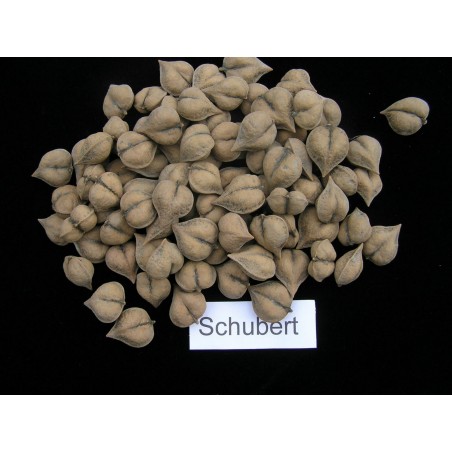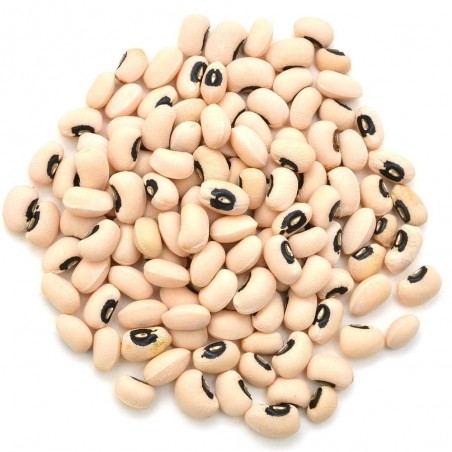
Heartnut Seeds - Juglans Ailantifolia Cordiformis
Heartnut Seeds - Juglans Ailantifolia Cordiformis
Price for Package of 1 seeds.
Heartnuts, like their parent the Japanese walnut, have an extremely hard exterior shell. The shell showcases a brown hue, often with darker brown to black striations. Like its name suggests the shell has a heart-like
Heartnut Seeds - Juglans Ailantifolia Cordiformis
Price for Package of 1 seeds.
Heartnuts, like their parent the Japanese walnut, have an extremely hard exterior shell. The shell showcases a brown hue, often with darker brown to black striations. Like its name suggests the shell has a heart-like shape and is smooth with slight ridging. Within the inedible shell lies the edible portion of the Heartnut. The shelled Heartnut has a thin, parchment-like skin that encases a creamy white nutmeat. The meat of the Heartnut has a smooth, soft, slightly oily texture and offers a mild and sweet walnut flavor without the bitterness found in conventional walnuts. Many varieties of Heartnut are fairly easy to crack perfectly in half which reveals a heart-shaped cross-section of the shell and whole, unbroken nutmeat.
Seasons/Availability
Heartnuts are harvested in the fall, once dried they can be available year-round.
Current Facts
Heartnuts, botanically known as part of Juglans ailantifolia var. cordiformis, are a variety of the Japanese walnut and a member of the Juglandaceae family. Also known as Seibold or Cordate walnut, Heartnut is its most common name which not surprisingly was given as a result of the nut's shape that resembles a heart both inside its shell and out. Heartnuts are popular among nut enthusiasts in Japan, the United States, and Canada and today are known not only for their unique shape and superior walnut flavor but also for their tolerance to cold, humidity, and pests, characteristics that many other walnut varieties are lacking.
Nutritional Value
Like all walnut varieties, Heartnuts offer plant sterols, alpha-linolenic acid, and heart healthy polyunsaturated and monounsaturated fats. They also offer fiber, antioxidants, and protein.
Applications
Heartnuts can be used in many preparations that call for conventional walnuts. Incorporate into baked applications such as banana bread, cookies, granola, cinnamon rolls, and muffins. Like many nuts, toasting will enhance their flavor. Toast, chop, and sprinkle atop oatmeal, fruit crisps, and yogurt. Chopped walnuts can also be added to savory applications such as pasta and green, grain, or potato salads. Heartnuts can be used to make sauces such as pesto, walnut cream sauce, or the Persian pomegranate walnut sauce known as fesenjan. Heartnuts can also be pressed to make walnut oil. When stored in a cool, dry place unshelled Heartnuts will keep for 6 months to a year. They can also be stored in the refrigerator or freezer to prolong their shelf life.
Ethnic/Cultural Info
Heartnuts are being studied for their adaptability to see if they would be a viable and potentially improved nut crop for the United Kingdom in terms of the current and future climate there. Unlike many other walnut varieties, the Heartnut is tolerant of a wide range of climatic variances ranging from hot and humid to cold with winter frost, a characteristic that scientists are predicting will be one of great value considering the climate change predicted to occur in the next few decades.
Geography/History
Heartnuts are native to Japan and are a seed sport of the Japanese walnut, which means that both the Japanese walnut and Heartnut share the same species. In the 1860s Japanese walnuts and Heartnuts were first imported to the United States. They quickly caught on as an ornamental tree as a result of their tropical looking foliage. By the 20th century, they were widely available from nurseries and became a popular tree amongst specialty nut growers both in the United States and Canada. Trees grown from seed take approximately 3 to 5 years to produce their first nuts, and grafted trees will produce even earlier. It takes 6 to 8 years for trees to produce a full, commercially viable crop. Once established Heartnut trees will produce consistently high yields and can grow up to 50 feet in height.
The yield starts after 1-3 years, so rather faster than the ordinary walnut.
| HEIRLOOM ? | Yes |
|---|---|
| Organic Seeds ? | Organic Seeds |
| Organic/natural ? | Organic/Natural: Yes |
| Edible ? | Edible |
| Pretreatment of sowing ? | Soak in water before sowing 12-24 h Stratification needed: Yes |
| Life Cycle: | Perennial plant : Yes |
| Handpicked seeds ? | Handpicked seeds |
| Resistant to cold and frost ? | Resistant to cold and frost |
| Plant is suitable for growing ? | The plant is suitable for outdoors cultivation |
| Origin of seeds ? | Belgium |
| Medicinal Plant ? | Medicinal Plant: Yes |


Your review appreciation cannot be sent
Report comment
Report sent
Your report cannot be sent
Write your review
Review sent
Your review cannot be sent
🌍 Worldwide Shipping from the EU
We ship worldwide from the European Union using registered air post with signature confirmation on delivery.
📦 Tracking Your Order
Log in to your account and go to Order History > Details to find your tracking number.
You will receive email notifications at every step — please check your spam/junk folder if you don’t see them.
Track your package via:
⚠️ Important Notices
Cash on delivery is not available.
Always provide a valid mobile number with country code when ordering (e.g., +365 456 7686 576).
Do not order to P.O. Boxes or if you cannot be home to sign for the package. We cannot leave parcels with neighbors.
If a package sent to a P.O. Box is lost or undelivered, you lose the right to a refund.
📦 Lost, Returned & Reshipping Packages
For customers in Brazil and Mexico:
We cannot refund packages lost or destroyed by customs.
If your package is returned, we will refund only the product cost — shipping costs are not refundable.
You must pay return postage (€2) and any costs for reshipping.
If a package is returned to us for any reason, you are responsible for paying the return shipping (€2) plus the cost to resend the package.
🚚 Shipment Delivery
Registered shipments require a signature from the recipient.
If your tracking shows the package is still at the origin post office, it means the package is in transit — please contact your local post office directly for updates.
We are not responsible for delivery times and cannot track shipments for you.
📅 Delivery Options & Estimated Times
Delivery Option Processing Time Notes Priority Delivery Ships in 1-7 business days Prioritizes order processing (not guaranteed faster delivery); delays possible during holidays (3-10 days) Secured Delivery Ships in 1-7 business days Available for orders up to €150; refund if lost Standard Delivery Ships in 7-10 business days More economical; delays possible during holidays (7-14 days) Estimated Delivery Time:
Within the EU: 3–20 days
Worldwide: 5–30 days
Example delivery times to the USA:
Delivered in 13, 17, 19, 22, or 27 days.Note: Delivery times depend on your location and the local postal system. COVID-19 may cause additional delays.
💰 Shipping Costs
Shipping and handling fees are calculated automatically during checkout based on the weight of the parcel and the destination country.
⏰ Order Processing Hours
We do not process or ship orders on Saturdays or Sundays.
💳 Payment Options
Bank Transfer (SEPA / IBAN / SWIFT-BIC)
Include your order reference in the payment description (e.g., "SGS-19811702"). Orders without payment within 7 days are automatically cancelled.PayPal
Payments accepted in Euros only. Please select Euros at checkout.Card Payment
For card payments, visit our other site: Exotic Seeds Store
We accept Visa, MasterCard, American Express, CB, Diners Club, Discover, China UnionPay, JCB, and Discover.
⚠️ Transaction Fees
Customers are responsible for any transaction fees. Please provide payment details to help us process your order efficiently.
📢 Final Notes
Before placing your order, please check our website for any special notices, holiday schedules, or specific conditions that may affect your purchase.
Related Products

























